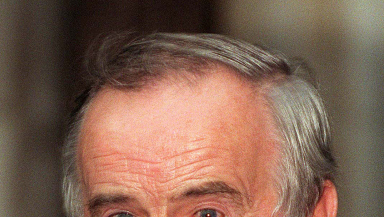
Albert Reynolds, Ireland's former prime minister, or taoiseach, remembered for his central role in the Northern Ireland peace process, has died aged 81 after suffering from Alzheimer's for several years.
Tributes poured in that credited him with paving the way for the peace process and the ceasefires and for taking risks which were brave for the time, arguing that without this work, the necessary confidence building and progress towards peace could not have been achieved.
Reynolds, happily married with seven children, entered politics after he had become a wealthy man as a result of his success as a dance hall owner and impressario.
Prompted by the 1970 Arms Crisis he became interested in politics and stood successfully for Fianna Fáil in 1977. He supported Charles Haughey's leadership through his party's subsequent election defeats and successes and was appointed to several senior cabinet positions. But by 1991 when Haughey's government was in trouble he became a rival and in 1992, after Haughey retired, won the leadership.
He weathered political controversies on the home front over issues such as abortion. It was his good relationship with John Major that helped underpin his peace work, leading to the signing of the Joint Downing Street Declaration on 15 December 1993. By the end of August 1994, almost 20 years ago to the date of his death, he, John Hume and Gerry Adams had brought the IRA to the table to agree to a complete ceasefire on 31 August 1994.
Fianna Fáil said: "It was Reynolds' determination that gave impetus to the peace process and the establishment of an IRA ceasefire in 1994, followed shortly afterwards by a loyalist ceasefire. Albert Reynolds asked the defining question 'who is afraid of peace?' His determination brought about what had seemed impossible."
Gerry Adams, president of Sinn Féin, tweeted: "Really sorry 2 hear of the death of Albert Reynolds. Solidarity 2 Kathleen & all their family. Albert acted on North when it mattered. RIP."
Francis Campbell, from County Down, former Ambassador to the Holy See and now principal of St Mary's University College in Twickenham, said: "He paved the way for the peace process and the ceasefires. He took risks which were brave for the time, but without which necessary confidence building and progress could not have been achieved. He lobbied Clinton hard, against stern opposition from HMG, to grant Gerry Adams a US visa. He was proved right on that one and that the US would help to influence Adams and consolidate the peace process within the Republican movement. He also signed the Downing Street Declaration in 1993 which brought about the ceasefire and eventually the Good Friday Agreements.
"When many criticised the Hume-Adams dialogue in the early 1990s, Albert Reynolds saw much promise in it. He and John Major were the right people in the right place at the right time. Without them the initial steps towards peace could have floundered."
Bishop Francis Duffy, of Ardagh and Clonmacnois, said: "I extend my prayerful sympathies to the family of Albert Reynolds, former taoiseach, cabinet minister and Dáil deputy for Longford/Westmeath who died this morning. Albert Reynolds will be remembered locally as a committed and sensitive politician who made a real difference to the lives of his constituents in our community and economy.
"As a talented politician Mr Reynolds played a significant role in the political life of this country. Nationally and internationally he will be remembered as a major player in bringing peace to this island. This achievement was embodied in the Downing Street Declaration of December 1993, which paved the way for the first IRA ceasefire of 31 August 1994. This success is a shining example of commitment to the common good and dedication to the long sought and precious goal of securing peace in Ireland. We remember in our prayers his wife Kathleen, his two sons and five daughters and family members. Ar dheis Dé go raibh a anam."
Fianna Fáil leader Micheál Martin said he had made an "incredible" contribution to progress.
"He brought an entrepreneurial spirit to the fore in Government, transforming the telecommunications industry in this country and developing the concept of county enterprise boards, enabling community based entrepreneurship and creating an infrastructure that survives to this day.
"He built many strong relationships with leaders in the European Union and used these to ensure real influence for Ireland, which culminated in him securing an unprecedented allocation of structural funds for the country.
"His most lasting legacy will of course be his immense contribution to the peace process, where his strength of character and single minded determination delivered the early breakthroughs which laid the foundations for the decades of progress that followed."
Former Fianna Fáil leader Brian Cowen said: "Albert Reynolds was a statesman who had a simple objective, to end violence and to set in train a framework for inclusive and exclusively democratic politics across the entire island of Ireland.
"He was the driving figure in bringing about the Downing Street Declaration, which laid firm foundations for peace to be built. The other great triumph of negotiation from Albert's time as Taoiseach was the IRA ceasefire in 1994 which was closely followed by a Loyalist cessation. This changed the entire dynamic of our island and so much of this is down to Albert Reynolds perseverance. Time and again, he would ask "Who is afraid of peace?"
"Albert Reynolds's political bravery and his wisdom were the key ingredients in fostering a new dispensation of peace, tolerance and reconciliation, mutual respect and equality on this island. For that he will always have the enduring respect of the Irish people. Ar dheis Dé go raibh a ainm dhílis."













